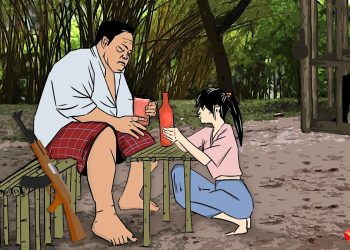The Myanmar military regime has enacted a new law making it compulsory for law enforcement officers to fight alongside soldiers on the front lines, while expanding their powers to restrict citizens’ civil liberties.
The law comes at a time when regime forces are sustaining huge casualties in both urban and rural areas amid fierce anti-regime civilian armed resistance following the coup last year.
At the same time, the regime has been struggling with a mounting number of defectors as well as a drop in recruitment as it becomes an object of popular hatred due to the army’s brutal crackdowns on anti-regime protesters. So far, the junta has killed more than 1,700 people.
The enactment of the Myanmar Police Act could be seen as a sign of desperation by the regime as it resorts to legal measures to solve the army’s human resource problems. The fifth provision of the law states: “At the necessary time, police must be involved in the state’s defense and security affairs.”
Myanmar’s previous police laws were the Rangoon Police Act, 1899; the Police Act 1945; the Karen State Police Act 1959; and the Kayah State Police Act 1959. There was no word about defending the state in any of these laws, or in the list of the Myanmar Police Force’s duties on the website of the Ministry of Home Affairs, which oversees the force. The new Myanmar Police Act abolishes the four previous laws, according to the regime’s statement.
A striking police officer said the new police law exposes the military’s lack of manpower.
“So, they are trying to use police to send to the battlefields. After the police, will they use firefighters and civil servants who have completed basic military training?” he said.
Law enforcement personnel have on occasion been used in non-policing roles: The military used police officers to attack the Arakan Army (AA), an ethnic armed group in Rakhine State, a few years ago.
Customarily, the ex-police officer said, it is understood that police should cooperate with the military during state emergencies, but this has always been taken to refer to situations such as civil defense during a foreign invasion.
“Now, they have enacted a new law so that they can openly use police officers,” said the ex-officer, who is among members of the police force taking part in the Civil Disobedience Movement.
Furthermore, in attempt to suppress civil liberties like freedom of expression, the new police law gives authority to law enforcement officers to take action without warrant against anyone who bangs pots and pans. The practice of beating pots and pans at night emerged last year as a popular collective method of protesting against the regime.
After the military council brutally cracked down on peaceful protesters last year, many people opted to engage in armed revolution, leading to intense fighting between regime forces and a growing resistance, particularly in Chin and Kayah states and Sagaing and Magwe regions.
From July 1, 2021 to March 20, 2022, a total of 2,193 battles erupted in parts of Karen State, Kachin State, Kayah State and Chin State, according to ISP Myanmar, an independent monitor group.
The growing number of dead and wounded soldiers and defectors has prompted the military to train and arm pro-military militias known as Pyu Saw Htee.
A total of 9,008 regime soldiers were killed and about 3,158 injured from June 1, 2021 to Feb. 21, 2022, according to the parallel National Unity Government (NUG)’s of Ministry of Defense.
The number of army defectors is also increasing, and is believed to number close to 3,000 including some battalion commanders. About 7,000 police officers have defected, according to Myanmar Police CDM channel.
Amid these challenges, coup leader Senior General Min Aung Hlaing vowed on Armed Forces Day on Sunday to annihilate the opponents of Myanmar’s military.
You may also like these stories:
Junta Forces Massacre 14 People in Upper Myanmar
Myanmar Junta Sentences Veteran Activist on his Birthday
Junta Court Charges Myanmar Journalist With ‘Incitement’

















